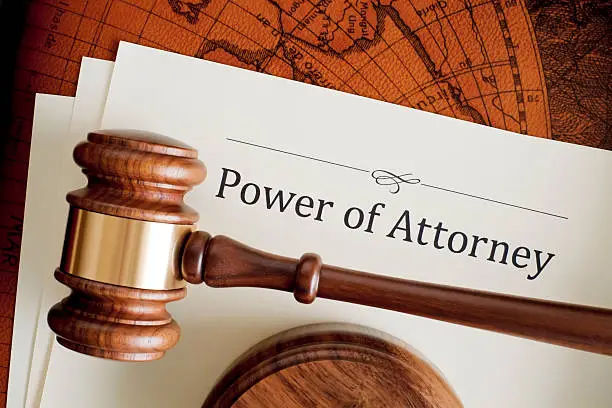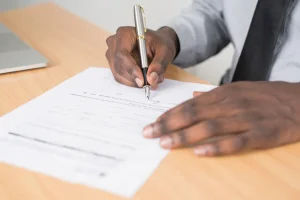How does Power of Attorney (POA) work as proof of ownership in Nigeria? Since it is a vital legal instrument used worldwide for various purposes, including property transactions, in Nigeria, it plays a critical role in establishing and proving ownership of property.

What is a Power of Attorney?
It is a legal document that gives an individual or entity the authority to act on behalf of another person in specific matters, like property management, sales, or acquisitions.
The person granting the authority is called the Principal, while the person receiving the authority is the Attorney-in-Fact or Donee. In Nigeria, the legal framework for POA is primarily guided by:
- Common Law: As a former British colony, Nigeria’s legal system incorporates English Common Law principles, which provide the foundation for many legal instruments, including Powers of Attorney.
- Land Use Act of 1978: Governs land ownership and transfers, where a Power of Attorney is often used to manage transactions or transfers.
- Customary Law: In some cases, customary laws may influence how Powers of Attorney are interpreted, especially in traditional property disputes.
Types and Uses of Power of Attorney in Nigeria
There are several types of POAthat cater to different needs:
- General Power of Attorney: Grants broad authority to the Donee to act on behalf of the Principal in various matters, including property management.
- Specific or Limited Power of Attorney: Restricts the Donee’s authority to specific tasks, such as selling a property or signing a contract.
- Durable Power of Attorney: Remains valid even if the Principal becomes incapacitated.
- Non-Durable Power of Attorney: Valid for a limited period or specific transaction, ceasing once the task is completed or the Principal revokes it.
In Nigeria, a Power of Attorney serves multiple purposes:
- Property Sales and Transfers: Enables the Donee to act on behalf of the Principal in selling, leasing, or transferring property.
- Banking Transactions: Used to manage bank accounts, withdrawals, or financial transactions in the absence of the Principal.
- Business Management: Grants authority to manage business dealings, including contracts and negotiations.
- Litigation: Allows representation in legal disputes related to property ownership or other matters.
- Estate Management: Facilitates property administration, especially when the owner is unavailable or incapacitated.
Role of Power of Attorney in Property Ownership
It is not inherently a document of ownership; instead, it serves as proof of authority to manage, sell, or transfer ownership of property. However, in Nigeria, it plays an important role in property transactions for the following reasons:
- Authority to Transfer Ownership: A valid Power of Attorney can authorize the Donee to transfer property rights, making it a critical instrument in sales agreements.
- Documentation in Legal Disputes: Courts in Nigeria recognize Powers of Attorney as evidence of authority in property-related disputes.
- Registration of Property: A registered Power of Attorney is often required to process land titles and certificates of occupancy in some states.
Key Elements of a Valid Power of Attorney in Nigeria
For a POA to be legally binding and admissible in Nigeria, it must include:
- Clear Identification of Parties: Names, addresses, and details of the Principal and Donee.
- Specific Authority Granted: Detailed description of the powers being conferred.
- Duration of Validity: Whether the Power of Attorney is temporary, durable, or for a specific transaction.
- Signatures and Witnesses: The document must be signed by the Principal and witnessed appropriately.
- Notarization and Registration: While notarization is not mandatory, registering the POA with relevant land registries enhances its legal weight.
How to Draft a Power of Attorney in Nigeria
Drafting a POA requires precision and adherence to legal standards. Below are the steps involved:
- Engage a Legal Professional: Consult with a lawyer experienced in Nigerian property law to draft the document.
- Include Necessary Information: Clearly state the authority, purpose, and limitations of the Power of Attorney.
- Use Clear Language: Avoid ambiguous terms to ensure the document’s enforceability.
- Obtain Necessary Signatures: Ensure that all parties sign the document in the presence of witnesses.
- Notarize and Register: While optional, notarization and registration at the state land registry are recommended for added validity.
The Importance of Registering a Power of Attorney in Nigeria
Although a POA is legally binding once signed, registering the document provides additional benefits:
- Enhances Credibility: Registered Powers of Attorney are more likely to be recognized by courts and third parties.
- Facilitates Property Transactions: Many land registries in Nigeria require a registered Power of Attorney before processing property titles.
- Provides Public Record: Registration ensures that the POA is part of public records, preventing fraudulent claims.
Challenges and Misconceptions About Power of Attorney in Nigeria
Despite its importance, there are common challenges and misconceptions about Powers of Attorney in Nigeria:
- Confusion with Ownership: Many people mistake a Power of Attorney for a title deed. While it grants authority, it does not transfer ownership.
- Fraudulent Use: Unscrupulous individuals sometimes misuse Powers of Attorney to sell or mortgage properties without the owner’s consent.
- Validity Concerns: Poorly drafted or improperly registered Powers of Attorney can lead to disputes or invalidation in court.
- Over-reliance: Property buyers sometimes rely solely on a POA without verifying actual ownership documents.
Case Studies: How Power of Attorney Serves as Proof of Ownership
Case Study 1: Land Sale in Lagos
In Lagos, a property owner granted a Power of Attorney to a relative to manage and sell land while they were abroad. The buyer insisted on seeing the registered POA before proceeding with the transaction.
Upon verification, the buyer used the Power of Attorney as proof of the seller’s authority, ensuring a smooth and legitimate transaction.
Case Study 2: Disputed Ownership in Abuja
A disputed property ownership case in Abuja highlighted the importance of a registered Power of Attorney. The court ruled in favor of the Donee, as the registered POA clearly authorized them to manage and transfer the property on behalf of the owner.
How Courts View Power of Attorney in Ownership Disputes
In Nigerian courts, the validity and enforceability of a POA depend on several factors:
- Proper Execution: The document must comply with legal requirements, including signatures and witnesses.
- Registration: Courts favor registered Powers of Attorney in disputes.
- Intention of the Principal: Courts assess whether the Principal genuinely intended to grant the stated authority.
- Consistency with Property Laws: The Power of Attorney must align with relevant property laws, including the Land Use Act.
Best Practices for Using Power of Attorney in Nigeria
To ensure the effective use of a POA in property ownership:
- Verify Authenticity: Always verify the authenticity of a POA before entering into transactions.
- Register the Document: Registering the Power of Attorney at the appropriate land registry adds legal weight.
- Consult a Lawyer: Engage legal professionals to draft, review, and validate the document.
- Confirm Ownership: Cross-check the ownership documents of the property to avoid fraud.
- Monitor Transactions: Principals should monitor the activities of Donees to prevent misuse.
A Power of Attorney is a powerful tool in property ownership and transactions in Nigeria, serving as proof of authority rather than direct proof of ownership. Its proper drafting, execution, and registration are critical to avoiding disputes and ensuring its effectiveness.
Understanding the legal framework, challenges, and best practices associated with Powers of Attorney can help property owners, buyers, and legal practitioners navigate Nigeria’s complex property landscape with confidence.
Always consult a qualified lawyer and verify all documents to ensure your transactions are secure and legally binding.


